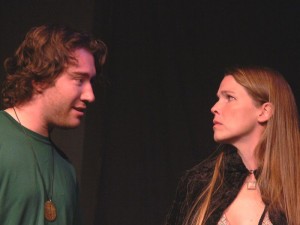A review of Arthur, the Begetting by the Actors Theater
The legendary King Arthur, he of the Kingdom of Great Britain and the Knights of the Roundtable, is never seen in Arthur, the Begetting, but through the intricately woven tapestry of words and history conveyed by the actors, especially Valerie Buxbaum as Igraine (the mother of King Arthur) in this play, one can begin to comprehend the vitality and complexity that gave birth to the Arthurian legend.
Ambrosius, the Roman leader of the fractious Britons, is assassinated on the eve of his coronation as High King. Will the next ruler be a “Dux Belloram”– a War Leader or a “High King”? This is the question the Actors Theater of Orcas Island bring to the stage in Arthur, The Begetting.
Only Igraine, Queen of Dumonia, seems truly to understand that a king and a war leader are not one and the same. She has a vision that she is to be the mother of the leader of Britain, and so she makes Faustian, devious, but noble-minded bargains with those she loves and those to whom she must constantly defend her own power and integrity:
- Theyrnon, King of Cornwall, for whom she has affection as her husband and father of her children;
- Emrys, King of Powys, with whom as a young girl she “lay side by side in the grass, counting stars and our future children among them;”
- Uther, King of Gwynedd, for whom she has a primal burning
But which of these men is to lead Britain? Which will avoid a civil war, where the land will be burned and the lives of the innocent spent?
The counterweight that moves in the balance is Igraine’s vision, her dream, of a High King who will unite Britain’s peoples so that their pagan, Roman and Christian heritage may no longer be under attack from the Irish, Pict, Angle and Saxon peoples.
Igraine’s deliberations are ponderous and suspenseful. Playwright Jeff Berryman gives his actors beautiful and densely rich words to act out their situation. There is no dumbing down in the language of this play; it is more approachable than in Shakespeare’s Hamlet but more restrained than in Lion in Winter, similar dramas along the theme of succession.
For all the fine poetic words of Arthur, the Begetting, the Orcas actors haven’t just learned their lines – they’ve lived the passions, fought the battles, surely and wholly become the roles they enact.
Valerie Buxbaum as Igraine is both luminous and burning with the devotion and passion of a leader, and the primal love of a mother for her children. Valerie never flinches in her portrayal of Berryman’s Igraine. In a role of profound deliberation, she has a scene of cooing to her baby and talking to her daughter Anna, (played by Valerie’s own daughter Ariel Vergen); and she faintly smiles to Emrys as she glimpses happier days to come. But for the rest of the play, Igraine/Valerie is dead serious. We hang on in tortured suspense as we follow her Machiavellian reasoning. Her quest is to preserve her own integrity, serve her destiny and protect her people.
In her role as the daughter Anna, Ariel Vergen is astonishing in her grasp of the role of the child placed in a dilemma beyond her years as war threatens. She says, “There is no man to match her [Igraine] and no woman to match my father.” Her role, too, is serious and stately, and young Ariel carries it off with an impressive naturalness. She sings most prettily, too, as does her mother.
In Igraine’s vision of the leader of Britain, she sees a man who is “rough, frightening, but full of love for the child.” Who among the tribal kings at hand is this man?
As Igraine’s youthful and faithful lover, Emrys, Indy Zoeller depicts openness, ambition and the sweet devotion of pure – if not practical love in his scenes with Igraine. And in several monologues, he delivers both legend and prophecies with fitting self-command and gravity.
As her good, but not quite great, husband Teyrnon, Zach Knight portrays the desperation of a would-be leader challenged not only by current events, but by a wife of superior morals. Igraine holds steady her convictions in the face of his power, bluster and emotional blackmail.
Uther, King of Gwynedd, is a swaggering bear of a character, and Evan Buxbaum, (Treehouse pediatrician and Valerie Buxbaum’s husband in real life), devours his warlike, vanquishing presence
Gaius, the Roman doctor who is imprisoned, suspected of murdering Ambrosius, tells Igraine of Ambrosius’ last moments, as she ponders who should be the High King of the Britons. As Gaius, Freddy Hinkle conveys a canny, self-protective interpretation of the dilemma before them all. He speaks with a clarity and wit that makes us realize we can relate to the history unfolding before us.
The stage presence of the actors is noteworthy. There is little “action” in the play, but the actors are viscerally “alive” with the historic passions and imminent drama of their characters’ decisions. The actors never falter as they speak momentous lines, but they are never carried away by the glory of the language or the passion of their characters. They are in another world, and we in the audience are like “flies on the wall,” seeing their destiny unfold. Their faces never for a moment stray from pre-Arthurian Briton. Igraine’s proclamation at the close of Act I is breathtaking.
These are commanding performances, without exception, by all of the “Arthur” actors. Begetting of righteousness, not worldly gain, is the dilemma presented forcefully in Arthur: the Begetting. It is a conflict somewhat foreign to us in our comfortable island enclave; but it is heart-stirring and thought-provoking as presented by the Actors Theater at the Grange.
Berryman has written a play of suspenseful drama and beautiful language. The actors speak the lines fluidly, as if they are thinking of them spontaneously. It makes the audience realize how abbreviated and meager our language (and concerns?) are now. Still, throughout the play are lines that bring the Dark Ages of Britain home to us:
- Igraine blesses her baby, saying, “We must be the best of ourselves now.”
- Gaius tells Igraine, “Little is growing but the weight of taxes;”
- Igraine reminds her childhood friend Emrys on several occasions, “It’s not ourselves as children anymore;”
- And Uther’s threat/promise to return to Igraine strikes fear and excitement in lovers for all times.
Life is serious, visions are to be heeded, and ambition (Freud called it ego) is both a good and bad thing — a driving engine that, without moral discipline, can explode and destroy. This play is not light entertainment and it does demand audience participation, in the form of “figuring it out.” It’s not only a ‘whodunit’ but also a ‘who will it be?’ The playwright’s mastery includes several plot twists and surprises, particularly in Act Two.
The actors have been rehearsing the play, under the direction of Doug Bechtel, since last spring. His enthusiasm and vision for the Actors Theater match the genius of the playwright and the actors: together they all have delivered a theatrical masterpiece of our generation. It is to be hoped that this production is repeated many times, and itself becomes part of Orcas theater legend.
“Arthur, the Begetting” will run tonight, Sept. 4 at the Grange at 7:30 p.m. It will continue next weekend, Sept. 10, 11, and 12, also at 7:30. Playwright Jeff Berryman will attend the closing night performance. There will be an opportunity to meet him and discuss the play after the curtain call.
Bechtel advises, “Due to some minor violence and mild sexual references this play may not be suitable for very young children. “Tickets are $10 and are available at Darvill’s Book Store, on-line at www.orcasactors.com or at the door. For additional information contact Doug Bechtel at 317-5601.
**If you are reading theOrcasonian for free, thank your fellow islanders. If you would like to support theOrcasonian CLICK HERE to set your modestly-priced, voluntary subscription. Otherwise, no worries; we’re happy to share with you.**







